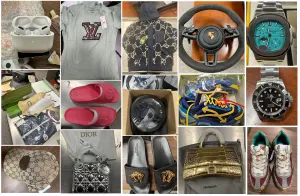This time valued at more than $400,000
ROCHESTER, N.Y. – U.S. Customs and Border Protection (CBP) officers at the Rochester Port of Entry seized various designer items throughout March and April for bearing counterfeit trademarks.
CBP officers had inspected several shipments that contained multiple “designer” clothing, shoes, handbags and watches, as well as Airpods and NBA branded rookie cards. After a thorough examination of the merchandise, all the items were determined to be not authentic and were seized for bearing counterfeit trademarks. Had these items been genuine, the total Manufacturer Suggested Retail Price (MSRP) value would be approximately $408,805 dollars.
“CBP plays a vital role in the protection of consumers and businesses from fraudulent products,” said Rochester Port Director Ronald Menz. “Our officers work tirelessly to intercept these fake items that have economic impacts, legal implications and a potential risk to the health and safety of the American consumer.”
CBP has the authority to detain, seize, forfeit, and ultimately destroy imported merchandise if it bears an infringing trademark or copyright that has been registered with the United States Patent and Trademark Office or the United States Copyright Office and has subsequently been recorded with CBP through the e-Recordation program. https://iprr.cbp.gov/s/. Other violations can include misclassification of merchandise, false country-of-origin markings, health and safety issues, and valuation issues.
Trade in counterfeit and pirated goods threatens America’s innovation economy, the competitiveness of our businesses, the livelihoods of U.S. workers, and, in some cases, national security and the health and safety of consumers. It is also against the law to import counterfeit or pirated merchandise and individual consumers may be liable for a fine even if they did not intend to import counterfeit or pirated merchandise.
If you have information about counterfeit merchandise being illegally imported into the U.S., CBP encourages you to submit an E-Allegation. The E-Allegation reporting tool provides a means for the public to anonymously report to CBP any suspected violations of trade laws or regulations related to the importation of goods into the U.S.
CBP has established an educational initiative to raise consumer awareness about the consequences and dangers that can be associated with the purchase of counterfeit and pirated goods. Information about the Truth Behind Counterfeits campaign can be found at The Truth Behind Counterfeits | U.S. Customs and Border Protection (cbp.gov)
Follow us on twitter @CBPBuffalo and @DFOBuffalo


